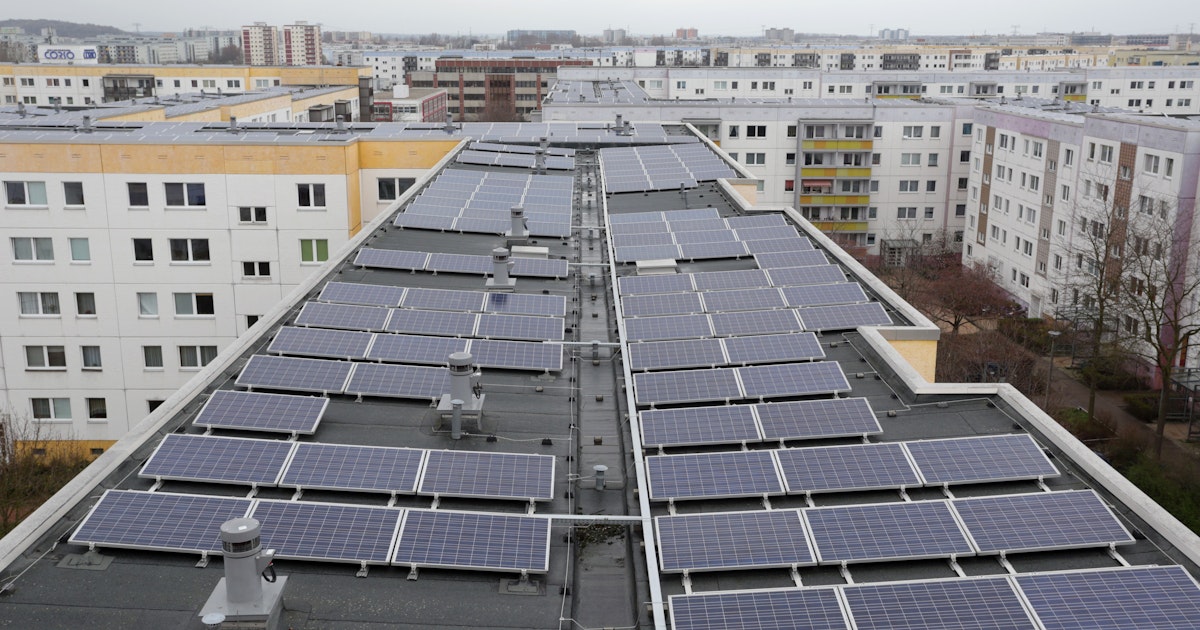Berlin – Renewable energies not only provide a way out of the climate crisis, but they are also fundamental to greater energy sovereignty and security of supply. But expansion is still going very slowly. Significant acceleration is urgently needed so that Germany can achieve its climate goals. An analysis by the Institute for Environmental Economics Research (IÖW) in Berlin shows that citizens in particular can play a critical role. Scientists have examined the potential of citizen participation in the energy transition through what is called energy sharing. This concept was proposed by the organization Bündnis Bürgerenergie.
The idea of energy sharing: Citizens produce and finance their own regional wind and solar energy in so-called renewable energy communities. This is intended to supply clean energy to private homes, but also entire communities, within a 25 kilometer radius. According to the IÖW study, communities should be able to use the power grid and gain a financial advantage if they simultaneously consume self-generated electricity from their “factory”.
Renewable energy communities increase acceptance
“If more people get this opportunity and join communities, they can achieve more at scale,” the IÖW authors wrote in their analysis. According to the study, with appropriate political support, citizens could bear 42 percent of the expansion of renewable energies by 2030 according to the current expansion plan to achieve climate goals.
“We are currently seeing a partial lack of acceptance for expanding renewable power plants developing into a brake pad,” says study author Astrid Aritz, an energy transition expert at IÖW. “We are convinced that it can be reversed: if citizens can participate in the energy transition themselves, they can become the mainstay for expanding renewable energies and thus for climate protection.”
Renewable energy communities can generate 75 TWh of electricity, enough to power nearly 34 million homes. 90 percent of all households in Germany can be supplied with electricity that depends on power sharing. Assuming members of the renewable energy communities contribute at least 12 percent of the investment costs of their plants, this would result in investments of €6.5 billion. This corresponds to an average of about 100 euros per member. “Thus, even a small membership fee enables participation in such a community, and the financial barriers to entry are kept as low as possible,” the Berlin scholars wrote.
Renewable energy communities can also form anywhere in Germany. The number of members of this community in densely populated areas, for example in the Ruhr area or in the area around the capital Berlin, is much greater than in rural areas. According to the IÖW study, the average renewable energy community has 10,800 members. The power-sharing capabilities of each federal state vary depending on the population. Therefore it is the largest in the populous states of North Rhine-Westphalia, Baden-Württemberg and Bavaria, and the smallest in Bremen, Hamburg and Berlin.
In the past twenty years, many societies in Germany have established renewable energy societies in which citizens, as co-owners of generating stations, are directly involved in the local expansion of renewable energies. The Bündnis Bürgerenergie has about 500,000 members throughout Germany. Also in Berlin, there is the BürgerEnergie cooperative, which claims joint operation of the Berlin electricity grid by the State of Berlin and Bürgergenossenschaft and promotes projects to expand renewable energies with the help of membership fees.
Energy sharing not yet funded
Energy sharing has great potential and should spread quickly in Germany, this is the clear recommendation of the IÖW scholars to politicians. After all, the federal government has set itself the goal of generating 80 percent of total electricity consumption from renewable energies by 2030, which is increasing as a result of sector coupling. However, to expand within a very short time, the acceptance and willingness of the local population to invest is also required. The IÖW authors conclude that energy sharing is an important method.
In order to advance energy initiatives, there must be financial incentives, among other things. For example, cutting additional electricity costs or paying premiums can help promote these models. Scientists also argue that it should be easy for everyone in Germany to switch to a renewable energy society.
Central problem: Energy sharing is not yet funded. The importance of the concept has long been recognized at the level of the European Union. In 2018, an EU directive was also passed, which gives former consumers the new role of so-called consumers, that is, people who can produce and consume a particular good, in this case energy. In the future, the peoples of Europe must be at the heart of the energy system and not only consume energy or collectively, but also generate, sell and trade it.
The EU directive was supposed to actually be implemented at the national level by June 30, 2021. But Germany has not yet sufficiently implemented this. For this reason, Bündnis Bürgerenergie had already lodged a complaint with the EU Commission against Germany in August last year. “In order for energy sharing to be economically feasible in the public power grid, the legal framework must now be quickly adapted to applicable EU law,” demands IÖW co-author Jan Wiesenthal. Then generation and consumption societies can be formed, which jointly invest in plants.
Renewable energy communities should receive fair compensation if they adjust their consumption in terms of time and space with the fluctuating generation of wind and solar energy. The entire power system would benefit from such grid-friendly behavior,” explains Wiesenthal. But for that to happen, the appropriate adjusting screws must be turned into the policy.

“Certified tv guru. Reader. Professional writer. Avid introvert. Extreme pop culture buff.”





![“Pikmin Bloom” Find the differences in honor of Children's Day!! Trump's status report is so useless that you can't help but laugh[Playlog #621]|. Famitsu application[موقع معلومات ألعاب الهاتف الذكي]](https://app.famitsu.com/wp-content/uploads/2024/05/8b2c6bdec98dc30711a5e845d65a4eb9-506x254.jpg)

More Stories
The Allen-Essingen Center for Electrical Technology opens its doors
Will sodium ion batteries replace lithium ion technology soon?
Kaspersky controversy: Revealing the use of artificial intelligence in Russian military drones